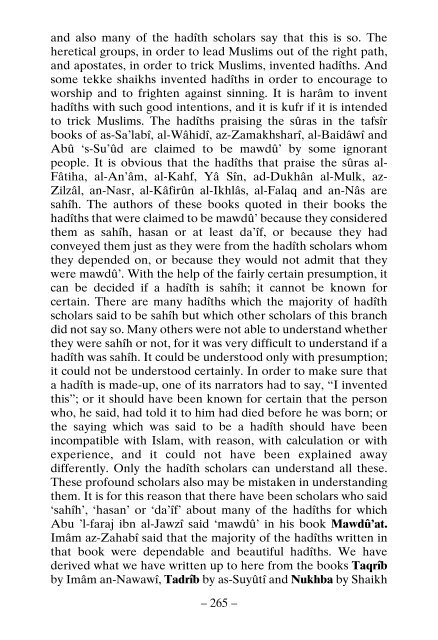Islams Reformers
The bigotry of the religion reformers or bigots of science who surfaced lately to blame all previous scholars, basic fundamental beliefs or practices
The bigotry of the religion reformers or bigots of science who surfaced lately to blame all previous scholars, basic fundamental beliefs or practices
Create successful ePaper yourself
Turn your PDF publications into a flip-book with our unique Google optimized e-Paper software.
and also many of the hadîth scholars say that this is so. The<br />
heretical groups, in order to lead Muslims out of the right path,<br />
and apostates, in order to trick Muslims, invented hadîths. And<br />
some tekke shaikhs invented hadîths in order to encourage to<br />
worship and to frighten against sinning. It is harâm to invent<br />
hadîths with such good intentions, and it is kufr if it is intended<br />
to trick Muslims. The hadîths praising the sûras in the tafsîr<br />
books of as-Sa’labî, al-Wâhidî, az-Zamakhsharî, al-Baidâwî and<br />
Abû ‘s-Su’ûd are claimed to be mawdû’ by some ignorant<br />
people. It is obvious that the hadîths that praise the sûras al-<br />
Fâtiha, al-An’âm, al-Kahf, Yâ Sîn, ad-Dukhân al-Mulk, az-<br />
Zilzâl, an-Nasr, al-Kâfirûn al-Ikhlâs, al-Falaq and an-Nâs are<br />
sahîh. The authors of these books quoted in their books the<br />
hadîths that were claimed to be mawdû’ because they considered<br />
them as sahîh, hasan or at least da’îf, or because they had<br />
conveyed them just as they were from the hadîth scholars whom<br />
they depended on, or because they would not admit that they<br />
were mawdû’. With the help of the fairly certain presumption, it<br />
can be decided if a hadîth is sahîh; it cannot be known for<br />
certain. There are many hadîths which the majority of hadîth<br />
scholars said to be sahîh but which other scholars of this branch<br />
did not say so. Many others were not able to understand whether<br />
they were sahîh or not, for it was very difficult to understand if a<br />
hadîth was sahîh. It could be understood only with presumption;<br />
it could not be understood certainly. In order to make sure that<br />
a hadîth is made-up, one of its narrators had to say, “I invented<br />
this”; or it should have been known for certain that the person<br />
who, he said, had told it to him had died before he was born; or<br />
the saying which was said to be a hadîth should have been<br />
incompatible with Islam, with reason, with calculation or with<br />
experience, and it could not have been explained away<br />
differently. Only the hadîth scholars can understand all these.<br />
These profound scholars also may be mistaken in understanding<br />
them. It is for this reason that there have been scholars who said<br />
‘sahîh’, ‘hasan’ or ‘da’îf’ about many of the hadîths for which<br />
Abu ’l-faraj ibn al-Jawzî said ‘mawdû’ in his book Mawdû’at.<br />
Imâm az-Zahabî said that the majority of the hadîths written in<br />
that book were dependable and beautiful hadîths. We have<br />
derived what we have written up to here from the books Taqrîb<br />
by Imâm an-Nawawî, Tadrîb by as-Suyûtî and Nukhba by Shaikh<br />
– 265 –

















